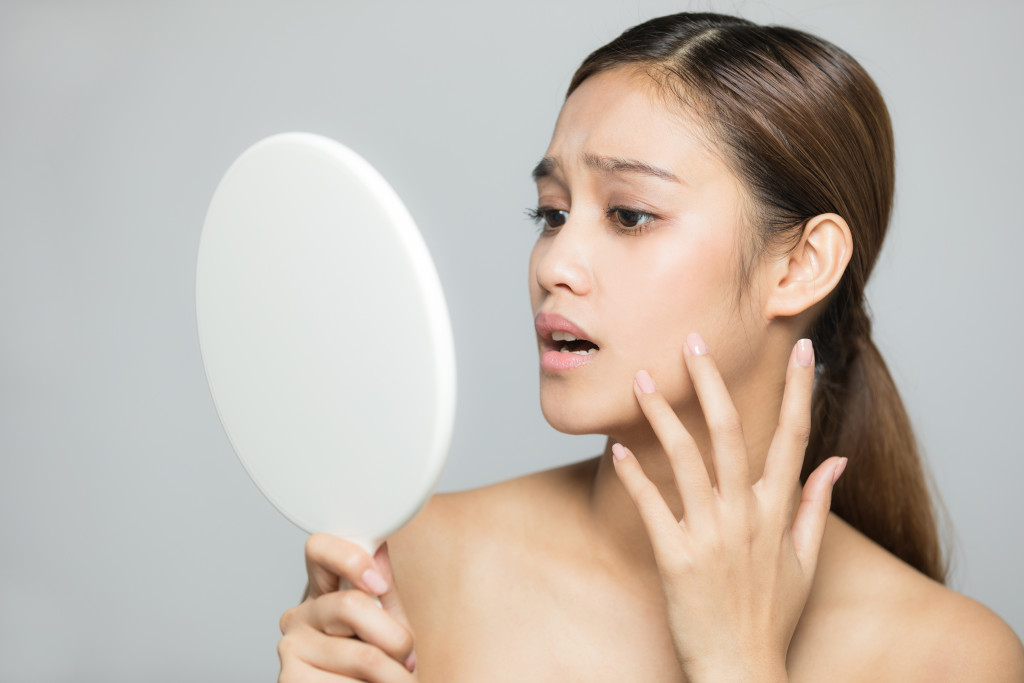- Skin is the largest organ and is essential to take care of.
- Common skin problems for adults include eczema, psoriasis, rosacea, and acne.
- Causes of these conditions may include genetics, diet, environment, allergens, stress, etc.
- Treatment options vary depending on the condition of the skin.
Your skin is your largest organ, so taking care of it is essential. Unfortunately, many adults suffer from a variety of skin problems that can be uncomfortable or even dangerous. Some of the adults’ most common skin conditions include eczema, psoriasis, and rosacea.
These skin issues can affect anyone and can range from mild to severe. The underlying causes of these conditions are often complex, as they can be related to genetics, diet, environment, and other factors. Here’s a closer look at these conditions and what you can do to treat them.
Eczema
Eczema is a chronic skin condition that causes redness and itching on the affected area. It can occur anywhere on the body but is usually found on the hands and feet. Eczema can be triggered by environmental factors such as stress, certain foods, and allergens like pollen or pet dander. Treatment for eczema may involve avoiding triggers, using moisturizers to keep the affected area hydrated, and taking anti-inflammatory medications if necessary.
Psoriasis

Psoriasis is another common skin condition characterized by an overproduction of cells leading to patches of thickened red skin with scales or flaking. Psoriasis tends to recur in cycles and is typically found on the scalp, elbows, knees, lower back, or genitals. Some of the effective treatments for psoriasis are topical medications, phototherapy, and systemic treatments. Dermatologists may also recommend lifestyle changes to reduce the severity of symptoms.
Rosacea
Rosacea is a type of facial rash that appears primarily on the nose and cheeks but can also affect other areas, such as the forehead and chin. Rosacea often causes redness, burning sensations and small bumps on the face that can be itchy or painful when touched. Treatment for rosacea usually involves avoiding triggers such as sun exposure or certain types of foods and topical medications like creams or gels designed specifically for this condition.
Acne
Acne is a skin condition that affects many adults and is characterized by unsightly blemishes, pimples, and cysts. Acne typically appears on the face, neck, chest, back, and shoulders. Many factors can contribute to acne, such as hormones, bacteria on the skin, diet, and medications. Acne treatment often involves topical medications, antibiotics, and chemical peels. It is important to consult a dermatologist for proper diagnosis and treatment of acne.
How to Take Care of Your Skin
Taking care of your skin is essential to prevent and treat skin problems. Here are some tips on how to keep your skin healthy:
Start Your Week With a Facial Massage
Always treat yourself to a facial massage. Doing this will help eliminate tension in your face and stimulate blood circulation. To start, apply oil or cream on clean skin and use your fingertips to make small circles around your eyes and forehead. You can also massage along your jawline and neck for an extra dose of relaxation.
Don’t Forget the Sunscreen

You must wear sunscreen every day—not just when it’s sunny outside! UVA rays from the sun penetrate through clouds and windows, so even if it’s not sunny out, you should still put on some SPF protection before going outdoors. The best kind is one with broad-spectrum protection (UVA/UVB) with an SPF of 30 or higher. Make sure to reapply as often as necessary throughout the day!
Exfoliate Gently
Exfoliating removes dead cells from your skin’s surface, leaving behind a brighter and smoother-looking complexion. However, it’s important not to overdo it; too much exfoliation can lead to irritation or damage your skin barrier. Stick with gentle exfoliants like chemical peels or mild scrubs once or twice a week; anything more could do more harm than good!
Hydrate From Within
Your skin needs hydration from both outside sources (like moisturizers) and inside sources (like drinking lots of water). On Fridays (or any other day), ensure you’re drinking at least eight glasses of water throughout the day to stay properly hydrated and give your body what it needs to function optimally! Not only will this help keep your skin looking great, but it’ll also help flush out toxins within your body.
It’s important to remember that these are only some of the many potential skin problems you may encounter as an adult. If you notice any changes in your skin – particularly any patches that don’t go away after a few days – it’s always best to consult with your doctor about possible diagnoses and treatments available for your condition.


